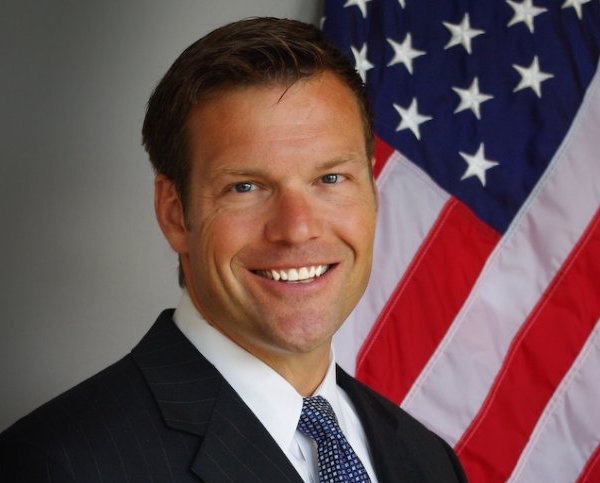Controversial anti-voter fraud program risks disenfranchising voters through racial bias, report finds

A Rolling Stone investigation found that a voter fraud prevention program launched by Kansas Secretary of State Kris Kobach has built-in racial bias that puts people with African-American, Latino and Asian names at greater risk of being wrongly accused of double voting. (Photo of Kobach via Wikipedia.)
Back in 2005, Kansas Secretary of State Kris Kobach — who as chair of his state's Republican Party championed an illegal voter suppression technique called "caging" — launched a program called Interstate Crosscheck to compare voter registration data across states and ferret out evidence of double voting.
The program has since expanded to 30 states, according to the National Conference of State Legislatures (NCSL), but it's been controversial from the start. For one thing, it's resulted in very few actual cases of fraud being referred for prosecution, as alleged cases of double voting in multiple states turned out to be clerical and other errors. One tally found that while the program has flagged 7.2 million possible double registrants, no more than four have actually been charged with deliberate double registration or double voting.
Meanwhile, some states including Florida dropped out of the program due to doubts about the reliability of its data — though others, including the swing state of North Carolina, joined despite those issues.
Now a new investigation from Rolling Stone raises fresh concerns about Interstate Crosscheck, finding that its methodology has a built-in racial bias that puts people with African-American, Latino and Asian names at greater risk of being wrongly accused of double voting.
Investigative reporter Greg Palast obtained lists compiled by Crosscheck in 2014 of alleged double registrants from several states. The program is supposed to match first, middle and last name, plus birth date; it also provides the last four digits of a Social Security number for additional verification. But Palast found that a quarter of the listed names lacked a middle-name match, that the system ignored designations of Jr. and Sr., and that Social Security numbers weren't included on any of the lists he obtained.
He asked database expert Mark Swedlund to review the lists from Georgia and Virginia. Palast reports Swedlund's reaction in a story titled "The GOP's Stealth War Against Voters":
[Swedlund] was shocked by Crosscheck's "childish methodology." He added, "God forbid your name is Garcia, of which there are 858,000 in the U.S., and your first name is Joseph or Jose. You're probably suspected of voting in 27 states."
Swedlund's statistical analysis found that African-American, Latino and Asian names predominate, a simple result of the Crosscheck matching process, which spews out little more than a bunch of common names. No surprise: The U.S. Census data shows that minorities are overrepresented in 85 of 100 of the most common last names. If your name is Washington, there's an 89 percent chance you're African-American. If your last name is Hernandez, there's a 94 percent chance you're Hispanic. If your name is Kim, there's a 95 percent chance you're Asian.
This inherent bias results in an astonishing one in six Hispanics, one in seven Asian-Americans and one in nine African-Americans in Crosscheck states landing on the list. Was the program designed to target voters of color? "I'm a data guy," Swedlund says. "I can't tell you what the intent was. I can only tell you what the outcome is. And the outcome is discriminatory against minorities."
Voters flagged as possible double registrants are sent a postcard and asked to verify their address by mailing it back to the secretary of state. But as Palast notes, this process is also fraught with bias:
According to the Census Bureau, white voters are 21 percent more likely than blacks or Hispanics to respond to their official requests; homeowners are 32 percent more likely to respond than renters; and the young are 74 percent less likely than the old to respond. Those on the move – students and the poor, who often shift apartments while hunting for work – will likely not get the mail in the first place.
A voter who appears to be double-registered and does not mail back the verification postcard is not necessarily immediately stricken from the voting rolls, as state officials have discretion over what to do next, and the process varies from state to state. But clearly Interstate Crosscheck's methodology runs the risk of falsely identifying people as double registrants, with the danger of disenfranchisement more likely to affect African-American, Asian and Latino voters.
Meanwhile, there's another, more reliable program to prevent double voting: the Electronic Registration Information Center, a project started by the Pew Charitable Trusts. ERIC currently has 20 member states plus the District of Columbia, according to its website. They include the Southern states of Alabama, Louisiana, Virginia and West Virginia.
A 2013 report by RTI International, a North Carolina-based research nonprofit, found that states participating in ERIC improved on every measure considered, including boosting voter registration and turnout and eliminating errors in voter files.
Tags
Sue Sturgis
Sue is the former editorial director of Facing South and the Institute for Southern Studies.
